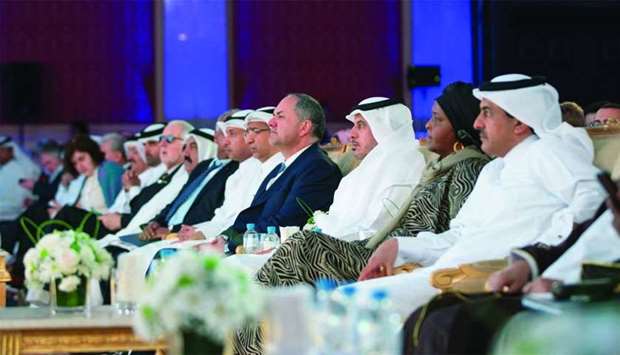*HE the Prime Minister and Interior Minister opens international conference
*An international centre for prevention, accountability and impunity has been recommended
The National Human Rights Committee (NHRC) chairman has proposed to include terrorism and blockades as crimes against humanity, at an international conference opened by HE the Prime Minister and Interior Minister Sheikh Abdullah bin Nasser bin Khalifa al-Thani on Sunday.
"We propose to include terrorism and blockades as crimes against humanity in the Rome Statute of the International Criminal Court of the year 1998, by amending the article 121 of its statute," said Dr Ali bin Smaikh al-Marri.
He was addressing the opening ceremony of the two-day event on “National, regional and international mechanisms to combat impunity and ensure accountability under international law," at Ritz Carlton Doha.
“The scale of violations at the beginning of this century has no parallel in the human history. Occupation, terrorism, blockades, and the targeting of civilians are the best proof of the breakdown of values and principles, which requires us to adopt an approach that takes into account that leaving the perpetrators of these violations without being accountable, threatens international peace and security,” stated Dr al-Marri.
The NHRC chairman also recommended the establishment of an international centre for prevention, accountability and impunity.
“The aim is to conduct studies, offer advice, support intergovernmental and non-governmental organisations and supporting countries in developing legislation and mechanisms. We propose that the United Nations High Commissioner for Human Rights, and the European Parliament be permanent and key members in this mechanism,” he noted.
Dr al-Marri has also proposed the Office of the High Commissioner for Human Rights to establish a working group to submit an assessment study on national, regional and international mechanisms to combat impunity to the competent entities of the United Nations system for developing legislation and mechanisms.
“We also propose the United Nations Human Rights Council to establish a special rapporteur on combating impunity and to call on the European Parliament to make further decisions in the area of accountability and combating impunity, as one of the important pillars of the partnership relations between the European Union and the countries of the world,” he continued.
The official noted that primacy of political and economic interests has become a stumbling block to the rule of law, the preservation of rights and freedom.
“In this context, the international community has a responsibility to uphold the principles of justice in the context of the humanitarian and moral imperative and joint responsibility in addressing the crimes that violate human rights. This can only be realised through fostering national, regional and international criminal justice mechanisms,” explained Dr al-Marri.
The NHRC chief noted that impunity inevitably leads to further abuses and tragedies, and makes victims lose confidence in the international human rights system. He maintained that the promotion of human rights has become the cornerstone of the progress of countries and the key pillar to reach a high international standing on the global level.
The official highlighted that the conference is the first of its kind in the region that reflects the firm commitment of the wise leadership of Qatar and its determination to establish a human rights system that ensures redress for victims.
He felt that the world cannot endure more tragedies and atrocities. “The realisation of justice and the punishment of perpetrators of these crimes have become a collective responsibility of the international community, including all countries, international and regional organisations and civil society institutions, through co-operation and co-ordination on the collection and documentation of evidence, and conducting investigations as well as undertaking measures essential to respect the principle of no impunity,” he added.


